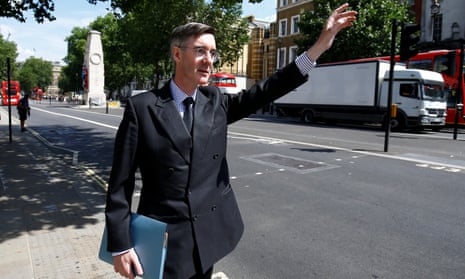Theresa May’s decision to accede to Jacob Rees-Mogg’s demand that the UK sever ties with the European Union on value added tax has been condemned by British business leaders.
It could also result in a hard border in Ireland, which would mean the proposal faces sudden death when considered by the EU, experts have said.
The British Chambers of Commerce (BCC), describing it as a “bombshell”, said it would add significantly to costs; could make exports to the EU more expensive and less competitive; and could impact on the cash flow for small businesses trading with the EU, putting some out of business.
In addition, there were warnings in Ireland that it could fuel a booming smuggling business if Northern Ireland was allowed to drop its VAT rates, making shopping across the border more attractive to more than 2 million people who live less than an hour away.
One former tax official said: “Irish revenue will have no choice but to protect their revenues and stop smuggling. It will be a barbed wire border if the Rees-Mogg amendment came to pass.”
On Monday May caved in to hardline Brexiters and accepted a key amendment to the customs bill tabled by Rees-Mogg and others.
The vote, which passed by 305 votes to 302, agreed an amendment that would ban the UK from raising taxes bound for the EU unless the bloc also collected taxes for Britain.
The BCC said this would be a bureaucratic nightmare and could end up with companies having to pay VAT on goods months in advance, which could have severe implications for small business who operate on tight cash flow.
“This is the first view businesses have on what the VAT regime could be like after Brexit – and it doesn’t look pretty,” said Adam Marshall, the director general of the BCC.
The organisation’s head of trade policy, Anastassia Beliakova, said it was unacceptable for a new VAT policy to be laid out in just two paragraphs in Monday’s last-minute amendment.
“We have been pressing the government on the VAT issue since January and for the government to give us the first indication of what it would look like without any detail for businesses is ridiculous. It has to recognise this is a critical business issue,” she said.
The issue is not different VAT rates across Europe, but the removal of a streamlined VAT system that is founded on single market rules.
VAT is not payable on exports to the EU but, after Brexit, EU member states are obliged to impose VAT as the UK becomes a third country and outside the VAT rules and EU information exchange system which identifies who should pay VAT.
The BCC said businesses had no idea how this would work, but it could pile additional work on HM Revenue & Customs which is already under pressure to come up with a new customs declaration system for Brexit.
“Businesses are hugely frustrated that politics and ideology – rather than real-world economic considerations – seem to be driving every twist and turn in the Brexit saga,” Marshall said.
In Ireland, alcohol smuggling has always been an issue with an estimated €4.29 in revenue lost per €12 bottle of wine. Before the single market in 1993, it was estimated that cross border smuggling lost Irish revenue £150m.
